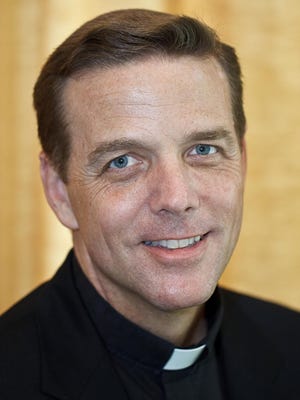SAVANNAH (GA)
Savannah Morning News [Savannah GA]
April 22, 2021
By Bishop Stephen D. Parkes
Interview by Adam Van Brimmer
The following is an excerpt from a “Difference Makers” podcast interview with Bishop Stephen Parkes of the Roman Catholic Diocese of Savannah. Comments have been condensed in the interest of space. Full episodes are available at SavannahNow.com/podcasts or through mobile device podcast apps by searching “Savannah Difference Makers”.
Question: You are one of two priests — bishops actually — in your family, as your brother leads the Diocese of St. Petersburg. Are we to assume that you grew up in a devout home?
Stephen Parkes: “Growing up, faith was always important. That said, I’ve often thought that we were not a particularly devotional family. We prayed before meals. We went to mass on Sunday. I had the opportunity to go to Catholic school from first grade through eighth grade. But otherwise, our family was into many different things, many different activities. Church was always important. Church was always a priority. And my parents set the expectations pretty high of what they expected. We were maybe not a devotional family, but we were a faithful family, which I would hope describes a lot of families today.”
Q: Priests and clergy of other faiths and Christian denominations talk about serving God as a “calling,” and that call comes at different times and in different forms depending on the individual. For you, it came in your 20s, after you’d earned a college degree and worked a secular job. What influences led you to the priesthood?
SP: “I always thought about being a doctor or a dentist or an orthodontist. I was very open to that; I went to college and took the sciences. I think chemistry kind of did me in. I enjoyed and did very well in the subject, but I didn’t necessarily have a grasp. I realized I was not a scientist. So I ended up with a degree in marketing.
“I think that experience prepared me well for the priesthood. Very often our paths in life are drawn with crooked lines, and we may pursue one area but inevitably it ends up elsewhere. We have to trust in God and have a sense of peace. I ended up working in retail for a period of time and then went to get a job with a bank, where I worked for three-and-a-half years before entering the seminary.”
Q: What were some of the challenges you faced internally in pursuing the priesthood?
SP: “When you enter the seminary, you have to realize that it’s a marathon, not a sprint. You also can’t wake up every day and ask ‘Is God calling me today to be a priest?’ It’s sort of the bigger picture and seeing it from a larger standpoint of our gifts, our talents, and again, where we received that gift of peace from. So there’s that knowing question, when you’re in the seminary. I was six years in the seminary and at some point you have to make the decision to buy that black suit and pursue this as my vocation because this is where God wants me to be.”
Q: A recent poll showed that for the first time ever a majority of Americans do not claim membership in some house of worship. Where is society in terms of being people of faith? And what can churches do to renew that sense of spirituality?
SP: “As people, we are very complex. We’re not just physical, we’re not just emotional, we’re also spiritual. So we cannot close that door to the spiritual side of ourselves. Some may not claim any particular religion as this survey indicates; however, it doesn’t mean that that spiritual side is not there. And we never know what will inspire them.
“We have to remember that God is always present to us. We may not always be present to God, but he’s always present to us, always making himself known. I think that’s through the gift of church and a faith community. It helps us to grow as people. And it’s more than just going to church and sitting in a pew on Sunday. It’s also that ability to learn its ability to care for the spiritual part of ourselves, to feed it.”

Q: Over the 2,000-year history of Catholicism, the church has faced many, many challenges. Today, the church is criticized for its stances on same-sex marriage, on women in the priesthood, and of course over the series of priest sexual abuse scandals. How much more difficult do those situations make it to get people excited about their faith again?
SP: “First and foremost, I will address the sexual abuse crisis. The churches have to recognize that there has been a blight upon us with this. And I pray for those who’ve been affected in any way, those who have been victims in any way, in our diocese and around the world. And I think we have to recognize that and walk the journey with them to know there is an opportunity for healing. There’s a definite need for transparency within the church, within our culture.”
“When it comes to other areas of our moral life, we are who we are. We believe certain aspects. And I think we have to realize that this is who we are. We as a church have to meet people where they’re at in those situations and bring them where God wants them to be. We have to listen. We have to be present. We have to have a sense of openness. But also we accompany people where God wants them to be. We don’t just say, ‘I’m here and you’re there.’ It’s how can we work together, care for one another, and walk together towards God.”
